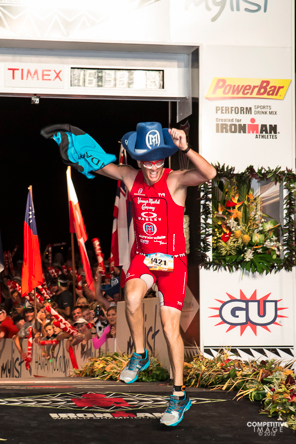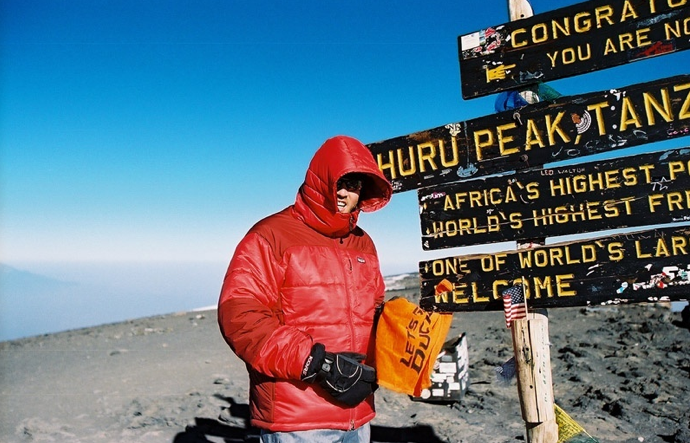By Kim Constantinesco
Sometimes in order to keep a secret, you have to disguise it from yourself.
With help from his parents, Bonner Paddock, 38, concealed his disability for the first 30 years of his life. Paddock has cerebral palsy, and wasn’t accurately diagnosed until he was 11-years-old.
“They never wanted it to get in my head that I couldn’t do anything,” Paddock said of his parents. “I had two older brothers who were very athletic. It was one of those things where if I was out playing soccer with them, my parents didn’t want to remind me of it. I knew I was different and I had to go to the doctor’s. Not talking about it was their philosophy…It wasn’t really a high priority in terms of conversation topics because we had so much going on in our family.”
Paddock is able to walk and talk unlike many people with cerebral palsy. However, he’s reminded of his disability every day.
“If you make a fist and squeeze really hard, that’s what the lower half of my body feels like every morning when I wake up. It stiffens up at night,” Paddock said.
Paddock was teased in school because he walked differently, had extremely skinny legs, big feet, and he fell a lot. Everything was so tight that his muscle development was very limited and slow, which produced his slender legs. He had size 11 feet by the time he was in 5th grade, but his equilibrium was way off.
“It was like my body was trying to figure it out by giving me big feet, but I didn’t have a lot of strength to use those feet that well,” Paddock said. “I would trip a lot. I was a pretty big target for some ribbing and teasing for sure.”
To fit in as best as he could, Paddock simply honed his technical skills when it came to athletics. He played goalie in soccer so that he wouldn’t have to run long distances. He was a catcher in baseball, and had someone run for him if he made contact with the ball while he was at bat.
Fast forward roughly 20 years to Paddock standing on top of Mt. Kilimanjaro, the tallest mountain in Africa, and at 19,341 feet, the tallest free-standing mountain in the world. Paddock became the first person with cerebral palsy to climb the mountain unassisted. He wanted to prove a point.
As one can imagine, Paddock’s 8-day journey was far from comfortable from a physical standpoint. From a mental point of view, it was just as challenging.
“It was my first experience taking on a challenge of that magnitude,” Paddock said. “The mindset was so different over there because I wasn’t comfortable. I was in a land I had never been to. I was still trying to get comfortable with my disability and talking about it publicly.”
A strenuous week-long hike sounds difficult for anyone, but for Paddock it takes on new meaning. His tissues aren’t in the right place because he walks differently. His body doesn’t really know how to adjust to it, which causes intense pain and fatigue.
The pictures of Paddock smiling in his red jacket at the summit only tell a portion of his story.
Sweating up Mt. Kilimanjaro was just what Paddock needed to help thin the mask that he applied to face the world.
Anyone that has reached a mountain summit knows that the journey is only half over at the top. Paddock still had more to prove on the descent and beyond.
Rather than the daily training hikes in his hometown hills in California and the intense core work that he went through to get ready for Kilimanjaro, Paddock moved on to the water and the bike. He hired world-renowned former triathlete Greg Welch as his coach. Paddock was ready to take on the Ironman.
Swimming 2.4 miles, biking 112 miles, and then running 26.2 miles is absurd for anyone. For someone with cerebral palsy, it appears impossible.
“Welch said I think this thing is so far beyond what’s humanly possible with what you’ve got so let’s focus on the swim and the bike because who cares about the run if you can’t even get there,” Paddock said of his training.
Paddock logged hundreds of hours in the pool and on the bike, and did minimal light jogs or walks to prevent major muscle damage.
Most people travel to Hawaii to lay on the beach and relax. Paddock booked his flight knowing that he was in store for anything but that. The race in and of itself is a challenge for anyone, but Paddock had other issues to consider.
“Fluids are really difficult to keep within my body because my muscles are tight,” Paddock said. “With the lack of absorption it’s very difficult to get proper fuel to my legs. It causes some really bad challenges with cramping and fatigue.”
Nevertheless, Paddock crossed the finish line in Kona dancing up a storm in a giant blue cowboy hat. Time: 16 hours, 38 minutes, 35 seconds. Paddoack came in 21 minutes before the race’s 17-hour cutoff time.
“It was total euphoria,” Paddock said. “I don’t even know what that dance was (2:45 mark). I was very emotional at Kilimanjaro and very happy, but it was no where near what going across the line in the Ironman was. It was a combination of so many emotions at once that I had never experienced at that level.”
Paddock attacked the Ironman in a more confident state of mind in comparison to Mt. Kilimanjaro.
“I was much more confident in who I was as a person versues just my abilities to overcome some individual task,” Paddock said. “As a kid I was ashamed of having cerebral palsy. On Kilimanjaro, I was still dealing with some of those feelings. During the Ironman, I was much more comfortable with my disabilities.”
Since climbing Mt. Kilimanjaro and completing the Ironman, Paddock has become a face for a disease that he concealed for so long.
“I think the purpose in my life is to shatter the barriers that people put onto people with disabilities,” Paddock said. “I tried to give some good examples.”
Paddock has started the One Man One Mission Foundation, which raises awareness and develops support centers to empower children with disabilities and their families to live life beyond limits.
“A lot of times people put their own limits on themselves more than anybody else puts limits on them, and that’s the biggest problem on this planet,” Paddock said. “The limits that everybody puts on themselves creates ignorance, selfishness, and jealousy.”
“I put limits on myself for 30+ years and compared myself to “normal” people.”
Next up? Rather than climbing one of the world’s tallest mountains or completing one of the world’s longest races, Paddock is writing a book due to come out at the end of 2014. It will chronicle his achievements and his battle with cerebral palsy.
Albert Einstein, one of the smartest men to walk the earth said, “Once we accept our limits, we go beyond them.”
Without a doubt, that’s a statement that Paddock has tipped his big blue hat to.




